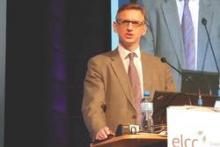GENEVA – Testing for mutations in the epidermal growth factor receptor gene has revolutionized treatment of advanced non–small cell lung cancer, but a significant proportion of patients with these tumors, in North America as well as elsewhere in the world, fail to undergo mutation testing at the time they are diagnosed.
Moreover, even when testing is done and a mutation is identified, a significant minority of patients do not receive treatment with a drug that can exploit their identified mutation, based on results from a recent, worldwide survey of more than 500 clinicians who manage advanced lung cancer patients.
This finding “is especially relevant given recent reports that overall survival is increased compared with chemotherapy when patients receive a specific thymidine kinase inhibitor that is matched to their mutation type,” Dr. James Spicer said at the European Lung Cancer Conference. “The reasons why many patients with cancer that contains a mutation in the EGFR [epidermal growth factor receptor] gene receive chemotherapy first line need to be understood,” said Dr. Spicer, a medical oncologist at Guy’s Hospital, London.
He and his associates ran the survey online during December 2014-January 2015 and received responses from 562 clinicians in 10 countries who manage patients with advanced non–small cell lung cancer (NSCLC), including 412 oncologists, 141 respiratory physicians, and 9 thoracic surgeons. Each clinician treated, on average, 59 newly diagnosed stage-III or -IV NSCLC patients every 3 months. Responses came from 120 U.S. clinicians and 41 from Canada, who formed the North American group of respondents. Another 251 clinicians practice in Europe (France, Germany, Italy, Spain, and the U.K.), and 150 came from Asia (China, Japan, and Korea).
The Asian clinicians tested for the presence of an EGFR mutation most commonly, with 82% saying that they consistently test and await the results before starting treatment, 10% saying they routinely tested but often did not wait for the results before starting treatment, and 8% not testing. This contrasted with 24% of the North American clinicians and 23% of those in Europe who said they did not routinely use EGFR mutation testing; 60% of the North American and 57% of the European clinicians said that they consistently test and use the results to guide their treatment decisions, Dr. Spicer reported.
Clinicians from all three continents showed a similar pattern of reasons why they did not routinely test all advanced NSCLC patients to guide treatment decisions, Tumor histology, for example indicating squamous tissue, was the top reason, cited by two-thirds to three-quarters in the three regions, followed closely by insufficient tissue. Poor performance status of patients was the third most common reason, cited by 21% in Asia, 39% in Europe, and 43% in North America.
Test results not arriving in a timely manner was a problem primarily in Europe and North America. In Europe, 22% of responding clinicians cited delays in getting results and not wanting to wait on initiating treatment as a reason for not testing all patients. In North America, 24% of clinicians cited this reason, compared with 9% of Asian clinicians.
Perhaps most troubling was that, even when testing identifies an EGFR mutation, a significant minority of clinicians on all three continents said that they nonetheless use conventional chemotherapy first and not a thymidine kinase inhibitor. Chemotherapy first was cited by 24% of clinicians in Europe, 19% in Asia, and 17% in North America. In addition, 60% of the clinicians in both Europe and North America said that they do not take into account the specific EGFR mutation identified by testing when deciding on initial treatment, while 28% of Asian respondents said that this was their approach.
“These survey results provide very interesting information but need to be taken with a grain of salt,” commented Dr. Tony S. Mok, the meeting’s designated discussant for the report. “You need to be aware of potential biases,” such as how the survey selected clinicians and the reasons why other clinicians did not respond, information not provided in Dr. Spicer’s report, said Dr. Mok, professor of clinical oncology at the Chinese University of Hong Kong and Prince of Wales Hospital, Hong Kong.
Although there clearly is room for improvement in how EGFR mutation testing is performed worldwide, with the potential to improve specimen quality and cut the time needed to get testing results, the findings from this survey do not provide clear insights into the best ways to improve EGFR mutation testing in patients with newly diagnosed, advanced NSCLC, he said.



